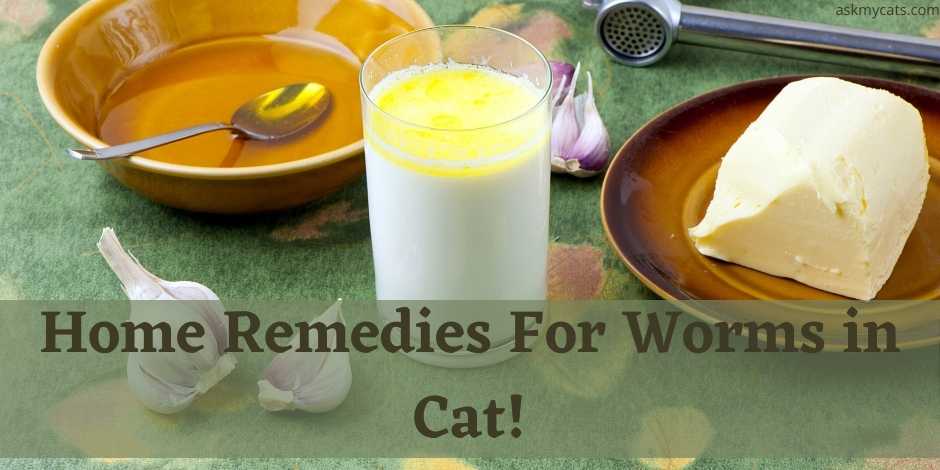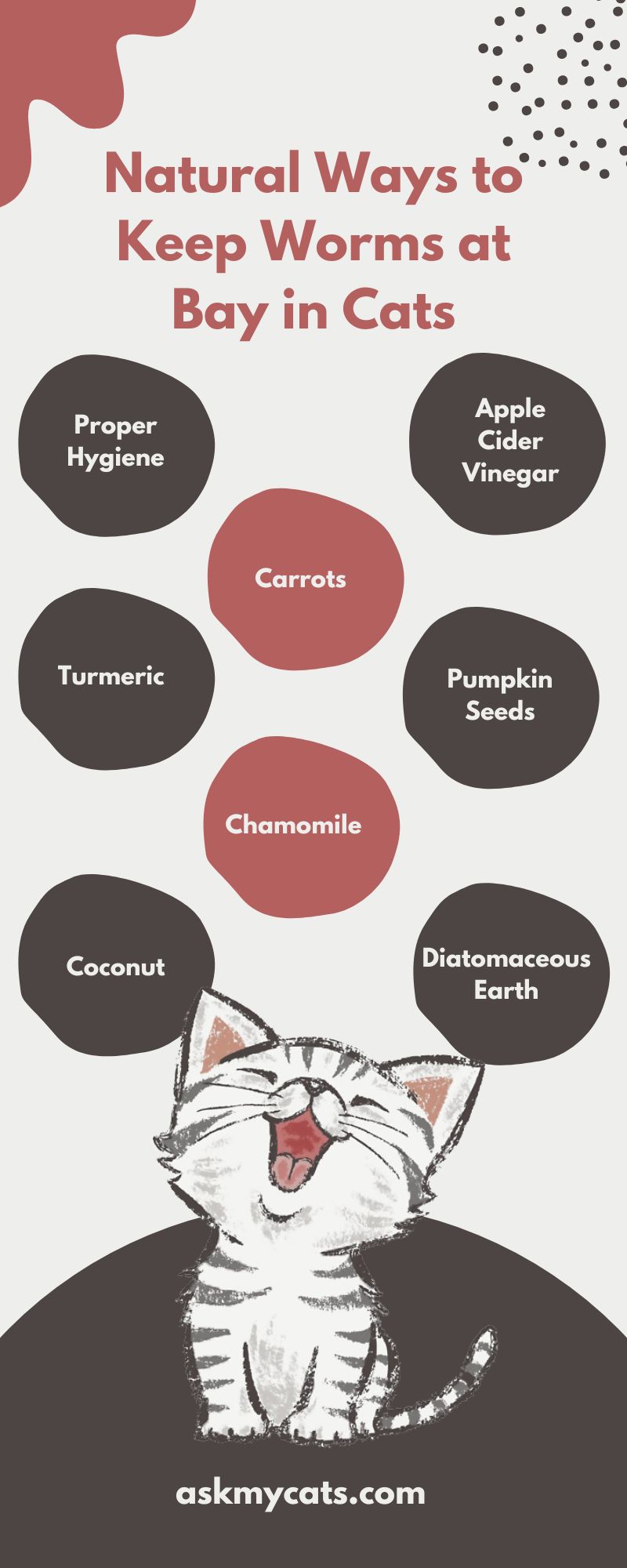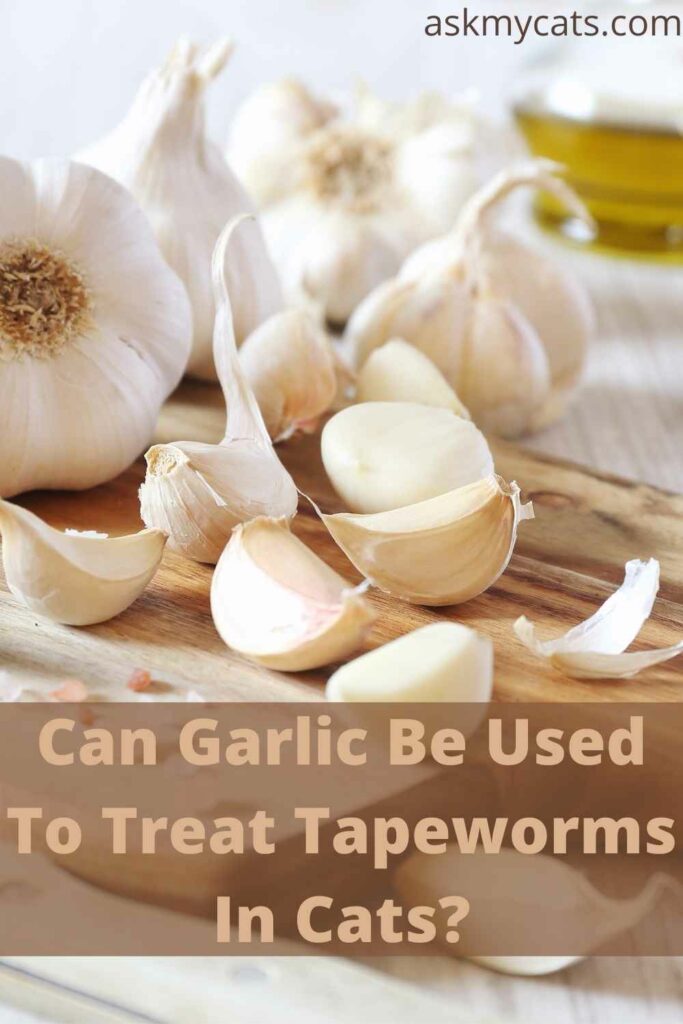Are you tired of constantly dealing with worms in your beloved feline companion? Don’t worry, we’ve got you covered!
In this article, we’ll be discussing some effective home remedies for getting rid of worms in cats. These natural dewormers are safe, affordable, and easily accessible. Plus, they’ll help your furry friend feel better in no time.
But that’s not all! We’ll also be sharing some tips on how to prevent worms in cats and keep your kitty healthy and happy. So if you want to say goodbye to those pesky worms for good, keep reading!
Important Disclaimer: It’s important to note that natural dewormer options may not be as effective as conventional medications and should be used with caution. It’s always best to consult with a veterinarian before using any natural remedies to treat worms in a cat.
Key Takeaways
- Natural dewormers for cats include: Carrots, Turmeric, Chamomile, Pumpkin seeds, Coconut, Apple cider vinegar, and Diatomaceous Earth
- Always consult a veterinarian before using natural remedies to treat worms in a cat
- To prevent worms in cats, keep the litter box clean, practice good hygiene, and use a monthly preventative medication as recommended by a veterinarian


Give Your Cat the Perfect Day
Get the Free Ebook!
Can I Deworm My Cat Myself?
Yes, you can deworm your cat at home, but it is always recommended to see your vet first in order to get the best possible advice, as every worming situation is different.
The most common way to deworm your cat naturally at home is by using turmeric, essential oil, and coconut oil.
7 Natural Dewormer For Cats! Home Remedies For Worms in Cat
There are 7 natural dewormers for cats: Carrots, Turmeric, Chamomile, Pumpkin seeds, Coconut, Apple cider vinegar, and Diatomaceous Earth.

Let us talk about them in detail: –
1. Carrots
These popular orange-colored veggies are high in vitamin A and, believe it or not, can help our feline companions get rid of worms.
As they are digested, coarsely chopped carrots scratch the walls of the stomach and gut, eliminating mucus and any parasites that may be present.
Carrots are a terrific source of nutrients for your cats and may be eaten as a delightful treat or included in meals.
They are completely safe, enhance the immune system, and are a great source of vitamins and minerals.
2. Turmeric
Turmeric is an ancient flavorful spice with a wide range of health benefits. It has been utilized in Ayurvedic and Chinese medicine for over 4000 years due to its therapeutic characteristics. It’s a magical spice.
Curcumin is the principal active chemical found in the plant’s roots and bulbs. It possesses anti-inflammatory, antioxidant, antibacterial, antiviral, anti-fungal, anti-coagulant, antiseptic, healing, etc., and anti-cancer qualities, making it a powerful weapon against a wide range of ailments.
When it comes to our pets, though, they are subjected to the same ailments as humans.
So, when it comes to our most beloved four-legged companions, turmeric is a superb natural herb that can assist in boosting your cats’ general health and vitality.
Turmeric is known for its anti-inflammatory effects, making it a superfood. It also contains components that can aid in the removal of worms and the repair of intestinal damage. Your cat’s gut will be healthier as a result of this!
Turmeric is a perennial herbaceous plant. It has therapeutic benefits and is unquestionably safe for cats. Turmeric is commonly used to heal diseases in cats.
It improves their immune system’s function, which aids in the fight against numerous ailments. Because of its medical benefits, Curcumin is given the nickname CURE-CUMIN by Baylor University Medical Center in Dallas, Texas.
3. Chamomile
Chamomile aids in the prevention and elimination of both roundworms and whipworms.
Chamomile tea is commonly used in pets for digestive issues, and it is believed to calm the entire digestive tract.
It is given to babies in Europe to reduce colic and teach them to nurse by giving it to them in a bottle. However, Chamomile, like many other herbs, has anti-parasitic properties.
Chamomile has been shown to be useful in the treatment of roundworms and whipworms. It’s best to give it to your car as a tincture; talk to your vet about the right dose for her.
Making it, only 1 tsp of tea, is all that is required; it is not difficult; experts recommend mixing at least 1/4 cup of water with 1/4 tsp herb. On the stove, bring 1/4 cup of water to a boil. Remove the pan from the heat.
Add 1/4 teaspoon of herb, cover it and set it aside for 2 minutes. After that, strain it. This is something you should give to your cat. Dr. Andrew Jones recommends a dose of 1 teaspoon for ten pounds of body weight.
Tiny newborns can be given 1/3 tsp of brewed tea in their formula twice a day with no problems.
Also, check out Cats And Chamomile: Know About Chamomile Before Serving It To Your Cat!
4. Pumpkin Seeds
Pumpkin seeds contain an amino acid called cucurbitacin, which makes them an excellent deworming agent. The worms are rendered immobile, allowing them to be readily removed from the intestine.
You can feed them whole as a treat or crush them into a fine powder and mix it in with your cat’s food. A teaspoon of raw pumpkin seeds per 10 pounds of body weight, taken twice daily, should be enough.
Pumpkin seeds are a great companion for any animal, especially your cat. Regular consumption of ground pumpkin seeds will cause them to become paralyzed, allowing them to lose their grip on the gut wall.
These unwelcome guests will be pooped out once they have been loosed! Continue to consume the seeds because there will be unhatched eggs that will grow into parasites, and we want to keep the parasite elimination flowing!
Cucurbitacin, an amino acid found in pumpkin seeds, paralyzes leeching worms, causing them to lose their grip on the walls of your or your cat’s intestines.
They are easily pooped out after they lose their grasp, with no additional involvement on your side. The seeds can be chewed. Grind them for your cat’s food, add them to a salad, or sprinkle them on other foods.
According to veterinarian Dr. Karen Becker, “Pumpkin seeds contain a compound called cucurbitacin, which can help rid the intestinal tract of worms.”
Dr. Karen Becker
5. Coconut
Dried coconut is a vermifuge, which means it can help you get rid of worms. 1 tsp for tiny cats, 2 tsp for medium cats, and 1 tbsp for large breeds, sprinkled on food.
When fed on a daily basis, coconut oil can help your cat get rid of parasites and has a variety of other health benefits.
Coconut oil can also be used to deworm cats naturally. Your cat’s body converts the lauric acid in coconut oil into monolaurin, which is known to be helpful against tapeworm, giardia, and other parasites.
Work up to 1 teaspoon of coconut oil for 10 pounds of body weight per day.
6. Apple Cider Vinegar
We’ve all heard about the health advantages of apple cider vinegar in recent years, but some believe that it can also be used to treat worms in cats.
It works because, unlike other vinegar, it raises the alkaline levels in the cat’s intestines, making parasites and worms unwelcome.
You may see an improvement in coat condition as well as several other health advantages if you add 1/4-1 teaspoon of raw organic ACV to your cat’s water every day.
You must read about what to expect after deworming a cat
7. Diatomaceous Earth
Diatomaceous earth is a powder made from the fossilized remains of tiny aquatic organisms. It’s made up of tiny, sharp particles that can help to kill worms by cutting through their exoskeletons.
To use diatomaceous earth as a natural dewormer for your cat, you can mix a small amount into their food or apply it topically to their fur.
Just be sure to use food-grade diatomaceous earth, as other types may be toxic to cats.
Expert Quote
“Diatomaceous earth is another natural option for controlling worms in cats. It’s a powder made from fossilized algae and it works by physically damaging the worms’ exoskeletons, causing them to dehydrate and die.
To use diatomaceous earth as a dewormer for your cat, sprinkle a small amount on their food once a day for a week.”
Dr. Jennifer Coates, DVM
Can Coconut Oil Be Used To Deworm Cats?
Yes, coconut oil can be used to deworm cats as it can convert lauric acid to monolaurin.

Coconut oil is one possible natural deworming option for cats.
This has some appealing advantages, both in terms of being a natural remedy and the fact that it may be more enjoyable for your cat to swallow than a pill.
As a result, it may be easier for owners to encourage their cats to consume coconut oil rather than medication.
Coconut oil has become increasingly popular among cats and dogs due to its health benefits, particularly its natural antibacterial characteristics.
As a result, coconut oil is known to have anti-parasitic properties, assisting in killing worms and their larvae in cats.
However, some cats may be allergic to coconut oil, and it is not recommended for cats with certain medical issues.
Furthermore, consuming too much coconut oil can result in diarrhea.
You will need to have your cat’s stool professionally checked by your pet’s veterinarian to discover whether or not the coconut oil has resolved his worm problem.
Coconut oil for cat worms should only be used if your cat’s veterinarian recommends it. It could be insufficient or inappropriate for your cat’s condition.
Never use coconut oil or any other product on your cat without first seeking professional advice from your cat’s veterinarian.
You would also like to check out Can Cats Have Coconut Oil? How To Use Coconut Oil For Cats?
How Do You Use Coconut Oil For Worms?
There are two ways to use coconut oil for worms, first is to swallow a tablespoon of pure coconut oil or rub it onto the infected worms.
Coconut is reported to have antibacterial and antiviral characteristics, which could aid in the treatment of worms in your cat.
This treatment necessitates a two-step procedure. Each morning, take a spoonful of pure coconut oil and give it directly to your cat or add it to its diet. Apply a tiny amount of coconut oil to the affected region at night.
You must like to read about are worms in cats deadly
Can Garlic Be Used To Treat Tapeworms In Cats?
No, garlic cannot be used to treat tapeworms in cats, as no study has given any evidence of that. Garlic may have a temporary inhibitory impact on larvae and egg production of the intestinal worm species studied.

Tapeworms are long, flat worms with a large number of segments. The tapeworm’s mature segments, which contain eggs, are discharged and passed in the feces.
These segments, which resemble rice grains, can be found in the cat’s hair near the anus, in the feces, and on the cat’s bed.
All tapeworms require an intermediate host to complete their life cycle.
The intermediate host must first ingest the eggs from the environment, and then the cat must eat the intermediate host to become infected.
Depending on the tapeworm type, different animals serve as intermediary hosts.
Dipylidium caninum and Taenia taeniaeformis are the most frequent tapeworms found in cats around the world.
Garlic contains compounds called disulfides and thiosulphates, which can cause the red blood cells circulating through a cat’s body to become very fragile and burst.
Therefore, ingesting garlic may result in the destruction of a cat’s red blood cells, a deadly condition known as hemolytic anemia.
You might find it interesting to know can i get worms from my cat sleeping in my bed
Can Essential Oils Be used For Deworming Cats?
Essential oils can be used for deworming cats as They will protect your cat from any external parasites and will also function as a repellant, preventing subsequent infections.
A simple method is to mix a small amount with a cat shampoo that is appropriate for your cat’s skin condition. Alternatively, you can bathe your cat as usual before applying the essential oil directly to its skin.
Approximately five drops should be enough. Make sure you don’t apply it to any open wounds or damaged skin.
If your cat has a skin problem, blend 20 drops of essential tea tree oil with 100 ml of basic vegetable oil such as sweet almond, rosehip, or argan oil before applying a little amount to the skin.
Also, you might like to read about how much is it to deworm a cat
Can Turmeric Be Used To Treat Worms In Cats?
Yes, turmeric can prove very effective in treating worms in cats; it can assist in boosting your cats’ general health and vitality.
Turmeric is known for its anti-inflammatory effects, making it a superfood. It also contains components that can aid in the removal of worms as well as the repair of intestinal damage. Your cat’s gut will be healthier as a result of this!
Turmeric is a perennial herbaceous plant. It has therapeutic benefits and is unquestionably safe for cats.
Turmeric is commonly used to heal diseases in cats. It improves their immune system’s function, which aids in the fight against numerous ailments.
Because of its medical benefits, Curcumin is given the nickname CURE-CUMIN by Baylor University Medical Center in Dallas, Texas.
You might also like to read about should I quarantine my cat with tapeworms
Homeopathic Dewormer For Cats
There are several homeopathic dewormers available for cats, including:
Verm-X: Verm-X is a herbal blend that helps to eliminate worms and other parasites from the digestive system. It is available in both liquid and tablet form.
Worm Out: Worm Out is a homeopathic remedy that is specifically formulated to target and eliminate worms in cats. It is available in both liquid and tablet form.
Bio-X Worm: Bio-X Worm is a homeopathic remedy that is formulated to help eliminate worms and other parasites from the digestive system. It is available in liquid form.
HomeoPet WRM Clear: HomeoPet WRM Clear is a homeopathic remedy that is formulated to help eliminate worms and other parasites from the digestive system. It is available in liquid form.
It is important to consult with a veterinarian or a trained homeopathic practitioner before giving your cat any homeopathic remedies.
Herbal Dewormer For Cats
There are several herbal dewormers available for cats, including:
Fenbendazole: Fenbendazole is an herb that is commonly used to treat worms in cats. It works by disrupting the worms’ metabolism and preventing them from absorbing nutrients.
Black walnut: Black walnut is a natural herb that has been traditionally used to treat worms in cats. It contains a compound called juglone, which has antiparasitic properties.
Goldenseal: Goldenseal is an herb that is commonly used to treat worms in cats. It contains a compound called berberine, which has been shown to have antiparasitic properties.
Wormwood: Wormwood is an herb that has been traditionally used to treat worms in cats. It contains a compound called thujone, which has been shown to have antiparasitic properties.
It is important to consult with a veterinarian or a trained herbal practitioner before giving your cat any herbal remedies.
When To See A Veterinarian
| Situation | Description |
|---|---|
| If you suspect your cat has worms | Even if you are not sure if your cat has worms, it is a good idea to have them checked by a veterinarian. |
| If you are unsure which type of dewormer to use | Your veterinarian can help you determine the best dewormer for your cat based on their age, health, and type of worms. |
| If your cat’s symptoms do not improve | If your cat’s symptoms do not improve after treatment, it is important to have them checked by a veterinarian. |
| If your cat experiences side effects from dewormer | If your cat experiences side effects after taking dewormer, contact your veterinarian for guidance. |
Frequently Asked Questions
Should I prefer home remedies over allopathy?
No, it is never recommended to use home remedies over allopathy as each cat has its own condition and severity of the infection. You can surely use home remedies, but they must be under the guidelines of your vet.
Can home remedies provide 100% results?
No, home remedies are not known to provide 100% results. That is why the advice of a vet is always recommended.
Can home remedies have side effects?
Yes, home remedies can have side effects depending upon the medical condition and allergies of your cat. Many cats are allergic to coconut oil, and excess use of garlic can also prove harmful.
Is it necessary to use a commercial dewormer for my cat?
It is generally recommended to use a commercial dewormer, as these products are specifically formulated to kill worms and are generally more effective than home remedies. However, it is important to consult with a veterinarian to determine the most appropriate treatment for your cat.
Final Words
Although many homemade remedies could be used to treat worms in your cat, your first logical step should be to consult your vet.
As he could guide you in the right direction after the proper diagnosis of your cat.
For any more questions, keep them right here at askmycats.com.
Also, check out about my cat has worms how do i clean my house
